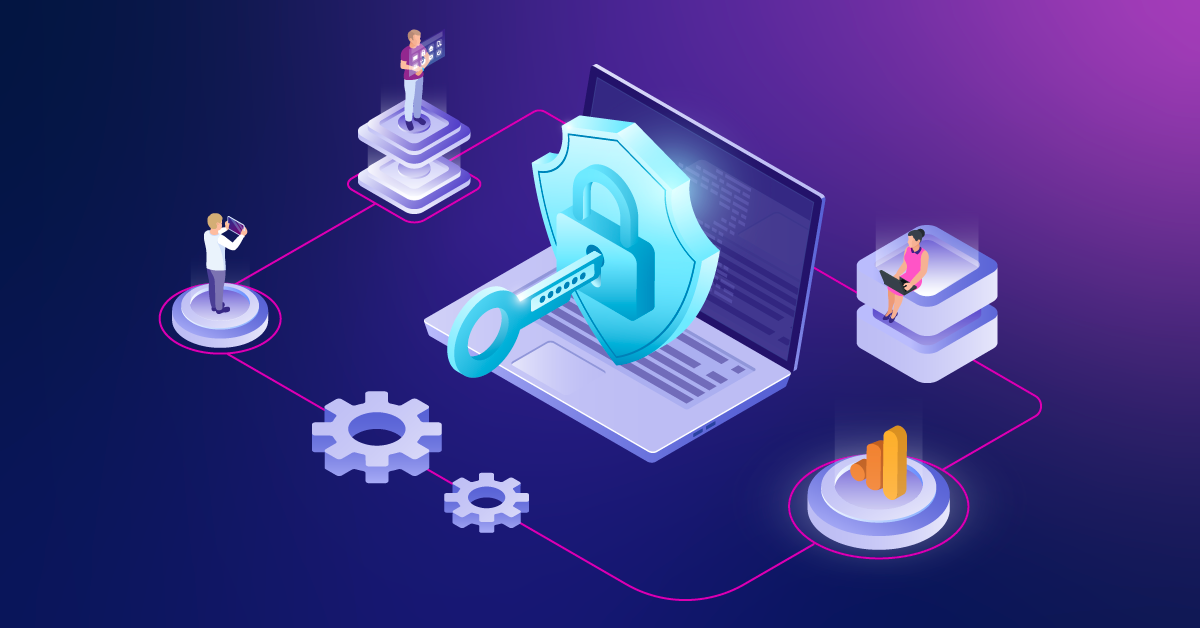Search Lessons From Google's Eric Schmidt
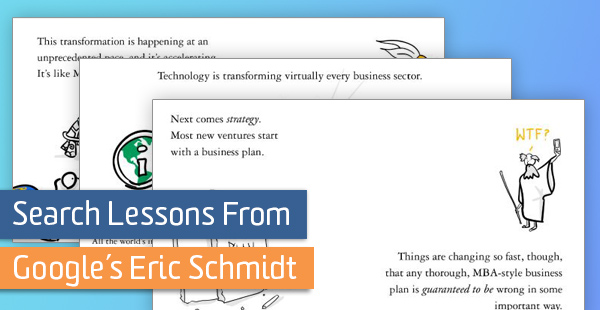
Eric Schmidt, executive chairman (and longtime CEO) of Google knows a thing or two about managing a growing business in the 21st century. He also knows a little bit about search.
In promotion of his new book How Google Works, co-written by Jonathan Rosenberg, he released a terrific little slidedeck summarizing the company’s approach to work (Full slidedeck at bottom of post).
Though the book and the slideshow are primarily aimed at the Management audience, these lessons are very relevant to those of us in the search world as well.
1. Transformation
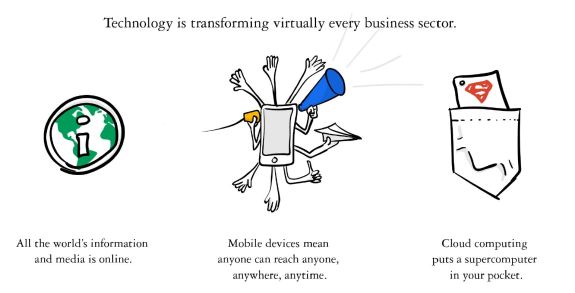
Certainly all of the above is true. It’s interesting to me that 2 of the 3 call-outs here address mobile. Many companies are being left behind by not having mobile-optimized websites and advertising.
“Those aren’t my customers” they say. This frustrates me as a Search marketer to no end. My phone has replaced my main computer in my personal life. When I say replaced, I mean I don’t own a desktop computer, or a laptop. Yes, you read that correctly.
I was the one in my family who “knew computers” and was never seen without one. Yet I live, date, shop, travel, socialize, work, game and read on my phone.
Think about what a colossal shift this is. As marketers we must take advantage. It’s too late to plan for the future of mobile. That future is here.
Google’s Webmaster Tools recently launched the helpful Mobile Usability report so that you can work on any reported errors and create a great mobile site.
It’s time to start using it! (We’re getting there, slowly!)
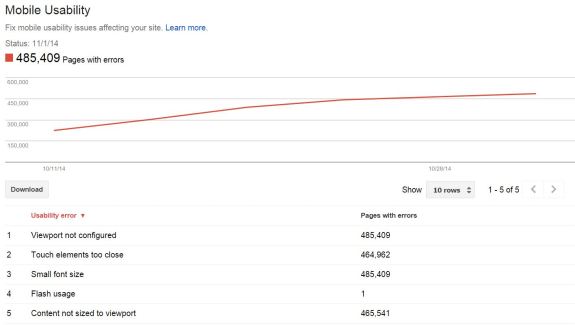
2. SEO Plans?
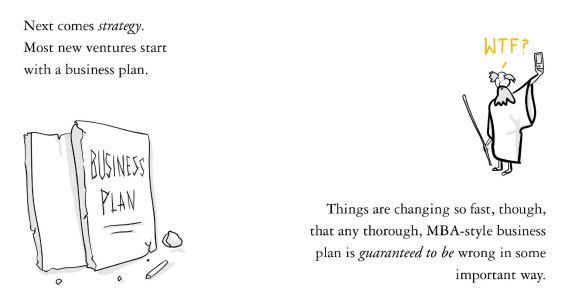
This is so true for SEOs and Search. Often, in-house search marketers and consultants spend the bulk of their time on planning and reporting. The value of reporting is doubtless but the value of planning can be dubious.
The digital landscapes are shifting so quickly that thorough digital marketing or SEO plans are often inadequate or outdated by the time of implementation.
Remember having access to search referral keywords in Google Analytics? Or making everyone in your company update their photo for the Authorship tag? How about targeting RSS feed users of Google Reader?
Sometimes things in your plan go away, and there’s only one thing you can do about it: be flexible.
The sad truth is that much of SEO revolves around reactions. Challenge yourself to establish goals that transcend the churn like improving conversion rates, becoming a content leader in a niche or cross-selling customers.
3. Three Pillars
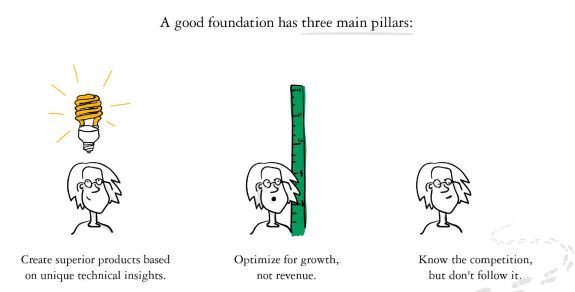
What wise words for anyone in digital marketing! Too often digital marketers find themselves in the role of follower; keeping up with trends, repeating previously successful tactics and chasing ROI.
Schmidt’s wise words are a great call for originality, growth-focus in our marketing tactics and awareness of our space.
For SEOs, I really see the last point as a reminder that marketing is like golf, you are only playing yourself. Often we focus solely on that competitor that ranks one spot higher in organic results at the peril of our company.
4. Foundation, Foundation, Foundation
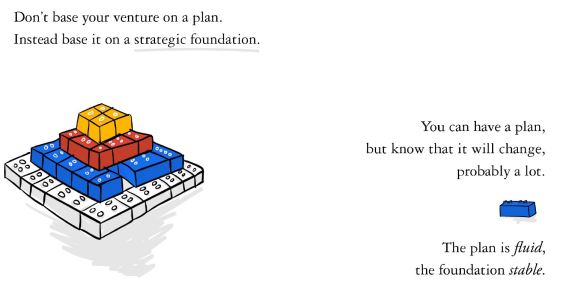
Stable foundations…hmmmm, how interesting. One of the more memorable SEO anecdotes from recent memory are from a Fortune 500 company with many, many pages. They only had one full time person dedicated to Search! How did they do this?
She didn’t optimize title tags and keyword-rich copy on every page, she built tools that empowered her entire organization to create SEO-friendly content with no training required. I’d call that a stable Search foundation.
Given the choice of pursuing great rankings for a handful of keywords that could change over time vs. empowering and enabling a worldwide company to create helpful content, she chose the later. This also requires organizational buy-in of course, and it is up to us as consultants and in-house Search experts to go to bat for this perspective.
Too often we rely on tactics and tricks, and once they quit working, we’re stuck. Make sure your SEO activities default to the important, sustainable, stable things that you can do over the long term.
Read another of my posts for additional Strategic tips: Three Ways to Shift Your SEO Strategy to a 2014 Mindset.
4. Moore’s Law x10
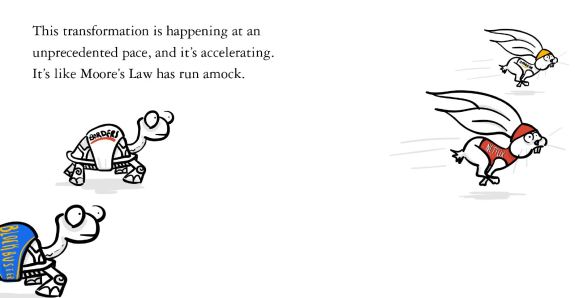
Remember Blockbuster? Me neither! Businesses can’t afford to be slow to adapt and neither can SEOs. We have to be dreaming of what’s next and thinking beyond merely Organic Traffic.
There are many ways we can harness the vast knowledge we have to help our businesses and clients. Here are some ideas:
Take these valuable lessons and run with them. Here is Eric’s full slidedeck, Enjoy! Which of the slides below do you find most inspiring? Tell me in the comments!

